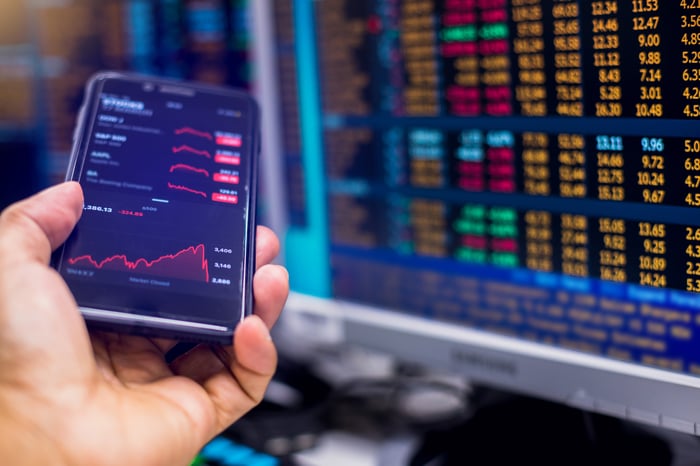In eight days, we'll mark the one-year anniversary of the beginning of the coronavirus disease 2019 (COVID-19) crash on Wall Street. It took just 33 calendar days for the benchmark S&P 500 to lose 34% of its value, marking the fastest bear market decline on record. While there was certainly plenty of panic, this volatility lured in young investors.
Investing app Robinhood, which is well-known for offering commission-free trades and gifting free shares of stock to new members, gained another 3 million new users last year. Since the average age of its user base is only 31, these are predominantly millennial and/or novice investors.
On the one hand, it's great to see young people putting their money to work in the world's greatest wealth creator. On the other, without a full understanding of the benefits of long-term investing and compounding, these millennials and novice investors have predominantly chased penny stocks and otherwise terrible businesses.
As of Feb. 7, half of the 10 most-held stocks on Robinhood's platform could be at risk of imploding in 2021.

Image source: Getty Images.
AMC Entertainment
Movie theater chain AMC Entertainment (AMC 11.00%) briefly supplanted tech giant Apple as the most-held stock on the entire platform last week. As of this past weekend, it was the second most-held stock. The simple fact that young investors have piled into a company that narrowly avoided bankruptcy just a few short weeks ago is telling and terrifying.
Through a combination of common stock offerings and debt capital, AMC was able to raise $917 million to secure enough funding to get through the winter. Management has also been considering additional share offerings with the company's stock soaring as part of the Reddit rally in recent weeks.
However, AMC Entertainment's business model looks like it's in serious trouble. For one, it's unclear when the coronavirus pandemic is going to end. Various polls have suggested that anywhere from a quarter to half of the U.S. population has no immediate desire to get a free vaccine, which could hamper the push toward herd immunity and the opening of movie theaters.
Additionally, AT&T subsidiary WarnerMedia announced plans to release new movies on HBO Max the same day they'll hit theaters in 2021. That's a real threat to the traditional movie experience.

A Tesla Model S plugged into a charging port. Image source: Tesla.
Tesla
Though I've been dead wrong about electric-vehicle (EV) manufacturer Tesla (TSLA 1.15%) thus far, the third most-held stock on the entire platform has a bubble-like quality to it. Investors have a history of grossly overestimating the adoption of new technology like EVs.
Obviously, Tesla has done plenty to impress Wall Street. It's effectively built itself from the ground up. It produced just shy of 500,000 EVs last year. The company's battery technology also holds clear-cut capacity, range, and power advantages over competitors in the U.S. As the icing on the cake, it generated an adjusted full-year profit last year.
Then again, Tesla is only profitable because it's been selling renewable energy credits (REC) to other automakers. Without these RECs, we're talking about a nearly $810 billion company that's still not profitable from selling its core product (EVs).
It's also unlikely that Tesla is going to be able to maintain its competitive edge in the U.S. with established auto stocks like General Motors and Ford investing $27 billion and $11 billion, respectively, into EV and autonomous vehicle research.

Image source: Getty Images.
Sundial Growers
Another absolute head-scratcher is that Canadian marijuana stock Sundial Growers (SNDL -2.82%) has worked its way to the No. 4 spot on Robinhood's leaderboard. Of the dozens of cannabis stocks to choose from, Sundial may well be the worst of the bunch.
Like AMC, Sundial has found itself among the most popular stocks with the Reddit crowd. But unlike AMC, Sundial isn't being targeted because of high levels of short interest. Instead, Sundial's penny stock share price has drawn millennials and novice investors.
Although Sundial has drastically improved its balance sheet over the past four months through a combination of share offerings and debt-to-equity swaps, it's also ballooned its outstanding share count by more than 1 billion shares in that time frame. This incessant dilution threatens to crush existing shareholders.
What's more, Sundial Growers is currently switching from lower-margin wholesale cannabis to higher-margin retail pot sales. It's probably a smart long-term move, but it'll result in the company continuing to lose money for the foreseeable future. In short, it makes no sense for investors to waste their time with such a chronic underperformer in a fast-growing industry.

The EC6 electric SUV. Image source: NIO.
NIO
Have I mentioned that millennial and novice investors really love EV-focused auto stocks? NIO (NIO 5.56%) is the fifth most-held stock on Robinhood's leaderboard, and was flirting with a $100 billion market cap just a few weeks earlier. But if the EV bubble does burst, NIO won't be spared.
China-based NIO has catalysts that resonate with investors. In January, NIO delivered north of 7,200 EVs, meaning it continues to grow its capacity in what should become the world's leading market for EVs. NIO's battery-as-a-service program is also drawing interest. This program lowers the initial cost of the company's EVs in exchange for enrolling buyers in a battery replacement/upgrade service that charges a monthly fee. It's a smart way to keep buyers loyal and make its EVs more affordable.
But this company, which is nearing a $100 billion market cap, isn't profitable and has only produced a little over 82,000 EVs since its inception. By contrast, large automakers can deliver that volume in a matter of days. The current valuation assumes there won't be any early stage operational hurdles, which probably isn't realistic.
Investors should be concerned about competition in China, too. Although it's a huge market, NIO remains a small fish for the time being.

Image source: Getty Images.
GameStop
Finally, the poster child for the recent Reddit rally: GameStop (GME 1.32%). The video game and accessories retailer checks in as the ninth most-held stock by Robinhood investors.
Last month, GameStop was the only publicly traded company to have more than 100% of its float held by short-sellers (i.e., investors who make money if a stock heads lower). Retail investors from the WallStreetBets chatroom on Reddit effectively banded together to buy shares and out-of-the-money calls on GameStop to create an epic short squeeze.
But even though GameStop has pulled well off its highs, it still offers plenty of additional downside. Once emotional short-term trading comes to an end, the remaining investors will be left with a company that waited far too long to focus on digital gaming. As a result, GameStop is busy closing some of its physical locations to reduce its operating expenses. It's essentially trying to backpedal its way into the profit column.
If Wall Street's estimates prove accurate, GameStop shares could fall 80% over the next year.
This article represents the opinion of the writer, who may disagree with the "official" recommendation position of a Motley Fool premium advisory service. We're motley! Questioning an investing thesis -- even one of our own -- helps us all think critically about investing and make decisions that help us become smarter, happier, and richer.





